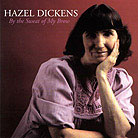April 2000
What I like most about Dickens is that she sings in the truest way: Rather than cultivate a "sound" and continually strive to conform to it as if such an ill-defined figment of the recording industry communicated anything specific, Dickens wears the folk singer's mantle. That is, she sings songs; she thinks hard about what the songs' words and melodies say, and she gets them to say it deeply and subtly by expressing many different traits of her voice. I find the most interesting of those traits to be a soft coyote-like trailing-off she attaches to many words ending in vowel sounds. She writes and chooses songs for their capacity to convey what it is to be a human being -- what it is to confront, acknowledge, and struggle with societal, social, psychic, and biological forces each of us experiences and deals with in his or her unique way, ultimately losing. The human tendency to succumb to those large forces necessitates that a thread of tragedy embroider Dickens' work and sometimes constitute its seams. My favorite song on the CD is "Are They Gonna Make Us Outlaws Again?" It is not the only Woody Guthrie-influenced song on the CD, but it directly refers to Guthrie's well-known "Pretty Boy Floyd" in the refrain: "Are they gonna make us outlaws again?/Is that what it's comin' to, my friend?/Well, I think I know why Pretty Boy Floyd done the things he did/Are they gonna make us outlaws again?" Although it is not one of the four songs featuring the Johnson Mountain Boys, it is one of the two or three on the album with the best bluegrass rhythms and arrangements. Joe Drumright's banjo shows you the hot rhythm and tempo at the outset and drives you through with lots of great licks and rhythmic variations along the way. The song's first verse also refers to Guthrie, whose great autobiography, Bound for Glory, recounts many of his experiences riding the rails and living a financially impoverished but spiritually rich life in the Oklahoma dustbowl and its aftermath. "Well, you never picked no peaches, never rode no boxcar train/Never worked out on a road gang or slept out in the rain/But when you see good people have to struggle, sweat and strain/When you can't feed your children, don't it make you stop and think?" Although Dickens sings with a proudly pronounced West Virginia twang (the liner notes make much of her origins in that "often maligned state"), another of Dickens' influences seems to be Joan Baez -- not in terms of singing style, and Dickens' music is much more bluegrass and country than Baez's. But the guitar introduction to the excellent first song, Dickens' own "Beyond the River Bend," is so similar to Baez's guitar in "Gospel Ship" on her 1962 In Concert album that it is inconceivable that Dickens does not know that Baez track. It is hard to imagine Hazel Dickens becoming a big, popular success in our time -- she is coal in a time of natural gas, home-made biscuits in an age of Chips Ahoy!. But it is easy to imagine her engaging and pleasing a knowledgeable folk-music audience, which remains large despite many CD stores' unconscionable lack of a designated "folk" section and large CD clubs' apparently not knowing the term "folk music." I love traditional folk music, as you could tell if you read my review of Dock Boggs several months ago. Yet when I first heard Dickens on an earlier album -- By the Sweat of My Brow is her eighth -- my response to her rough Appalachian voice was, You've got to be kidding! Now I get it: Dickens isn't pretending to be "trained," nor does she aspire to the status of Beverly "Bubbles" Sills. She's working hard to be a good folk singer, and that's what she is. GO BACK TO: |
 Hazel Dickens - By the Sweat of my Brow
Hazel Dickens - By the Sweat of my Brow![[Reviewed on CD]](../format/regcd.gif) "There's
a path that leads back through my memory/And how often I've walk it these days/For I find
sweet peace among the flowers/On the grassy bank beyond the river bend." So begins
Hazel Dickens' CD By the Sweat of My Brow. She wrote six of its songs and so
carefully selected the other six to fit her values and style that, unless one knows the
songs in advance of hearing the album, it is very difficult to sort the originals from the
covers without reading the liner notes.
"There's
a path that leads back through my memory/And how often I've walk it these days/For I find
sweet peace among the flowers/On the grassy bank beyond the river bend." So begins
Hazel Dickens' CD By the Sweat of My Brow. She wrote six of its songs and so
carefully selected the other six to fit her values and style that, unless one knows the
songs in advance of hearing the album, it is very difficult to sort the originals from the
covers without reading the liner notes.